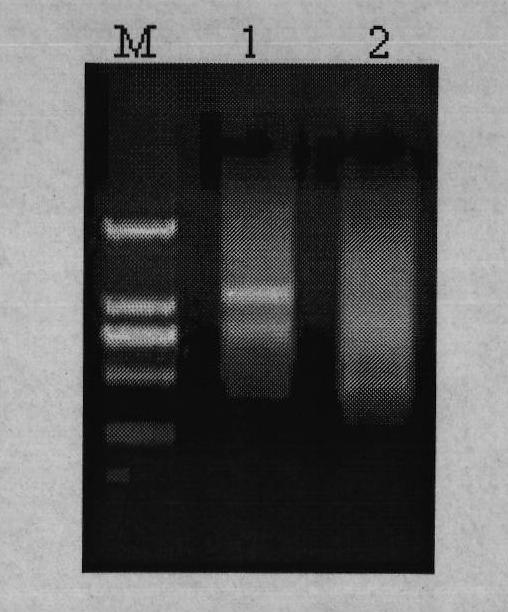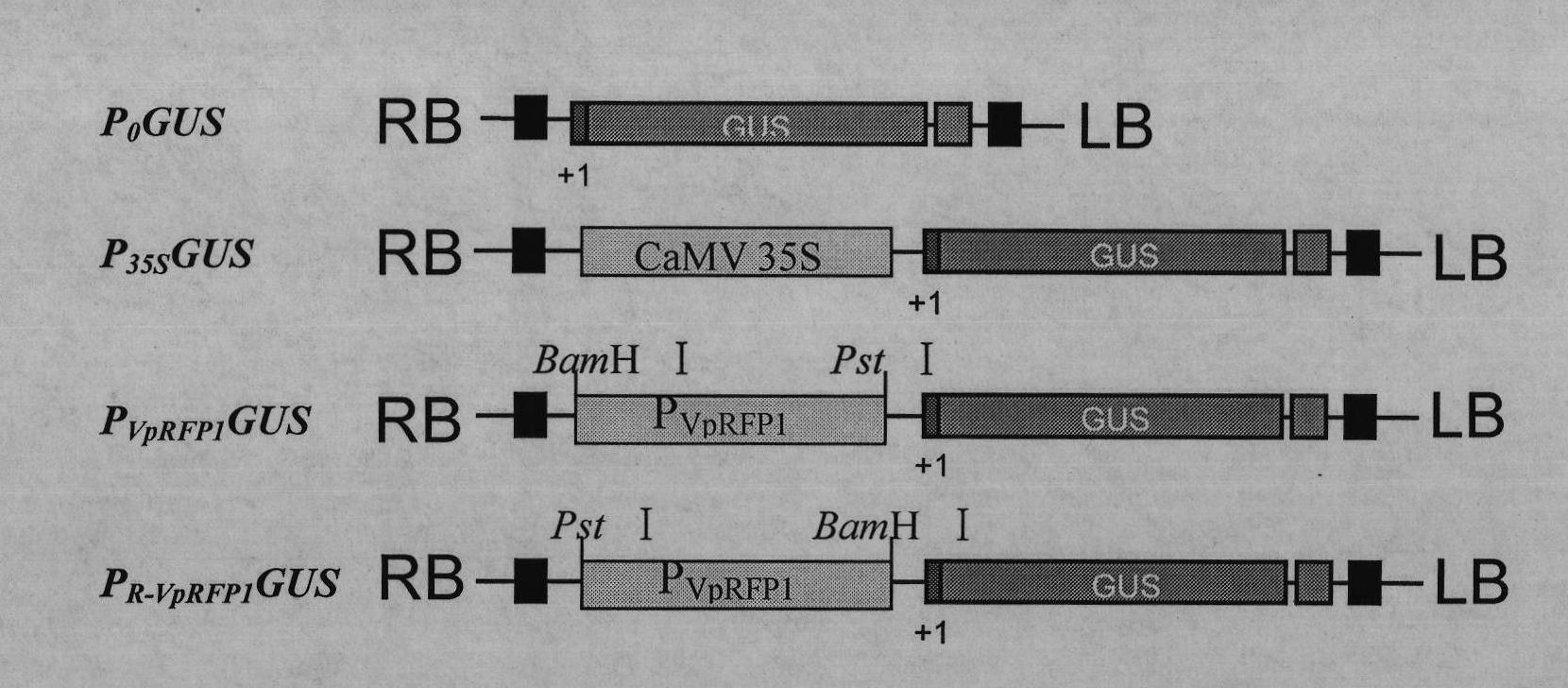Grapevine powdery mildew resistance transcription factor gene VpRFP1 promoter sequence and application thereof
A powdery mildew resistance gene and promoter sequence technology, applied in the field of genetic engineering, can solve the problems of less research on cultivated crops
- Summary
- Abstract
- Description
- Claims
- Application Information
AI Technical Summary
Problems solved by technology
Method used
Image
Examples
Embodiment 1
[0021] Example 1: Cloning and sequence analysis of grape VpRFP1 gene promoter
[0022] a. Grape genome DNA was extracted using the CTAB method. Take 0.2-0.5g of young leaves and place them in a mortar, add liquid nitrogen and grind them into powder, quickly put the powder into a 2ml centrifuge tube, add 500μl CTAB buffer, and then Add 100 μl of 20% PVP and mix well, add an equal volume of chloroform-isoamyl alcohol (24:1), invert the centrifuge tube and mix well, incubate at 65°C for 30min, cool to room temperature, centrifuge at 12000rpm for 10min; take the supernatant and transfer To another clean centrifuge tube, add twice the volume of absolute ethanol or an equal volume of isopropanol, and let stand at room temperature for 15-30min to precipitate DNA; add 1ml of 70% ethanol to a 2ml centrifuge tube, and transfer the DNA into Wash it once; add 1ml of absolute ethanol to a 2ml centrifuge tube, transfer the DNA to it and wash once; pour off the absolute ethanol, leave the DN...
Embodiment 2
[0042] Example 2: Response of grape VpRFP1 gene to pathogenic bacteria
[0043] SDS / phenol method was used to extract the total RNA of leaves at different stages after inoculation with pathogenic bacteria, according to PrimeScript TM RT-PCR Kit instructions for reverse transcription, 7 reverse transcription products in different periods are used as Real-time PCR templates to detect the response of Chinese wild East China grape powdery mildew resistance gene VpRFP1 to pathogenic bacteria in resistant strains, Real- time PCR according to TAKARA's SYBR PremixEx TM TaqII kit for operation, the reaction system is: template 1 μl, SYBR Mix 12.5 μl, forward and reverse primers 1 μl each, sterilized distilled water to make up to 25 μl, the reaction program is: 95°C 5min; 95°C 30S, 68°C 30S, 72°C ℃30S, 30 cycles; 72℃5min; 4℃10min, VpRFP1 forward primer is 5'-GCAAACAGTCCCCAAGTC-3', reverse primer is 5'-CTGAACAACACCCACCACT-3', VpGAPDH is used as internal reference gene, forward primer i...
Embodiment 3
[0044] Example 3: Response of grape VpRFP1 gene promoter to biotic and abiotic stress
[0045] The Chinese wild East China grape powdery mildew resistance gene VpRFP1 promoter sequence was connected to the plant transient expression vector pC0390GUS, and the activity of the Chinese wild East China grape powdery mildew resistance gene VpRFP1 promoter and the effect of the promoter on pathogens, pathogen-related signal molecules, high temperature and low temperature were detected. Reactivity of Chinese wild grape powdery mildew resistance gene VpRFP1 using the forward primer 5'-GGG GGATCC GTGGATGTGTTAAATTAAGTGGAGTTTATAGG-3', reverse primer 5'-GGG CTGCAG GGTTGAGTCGAGTCGCCTTCACAGAACGG-3' was used for PCR reaction to obtain the full-length promoter sequence of the powdery mildew resistance gene VpRFP1 of Chinese wild East China grape, which was cloned into the plant transient expression vector pC0390GUS. After the correct sequence of the promoter was verified by sequencing, the r...
PUM
 Login to View More
Login to View More Abstract
Description
Claims
Application Information
 Login to View More
Login to View More - R&D
- Intellectual Property
- Life Sciences
- Materials
- Tech Scout
- Unparalleled Data Quality
- Higher Quality Content
- 60% Fewer Hallucinations
Browse by: Latest US Patents, China's latest patents, Technical Efficacy Thesaurus, Application Domain, Technology Topic, Popular Technical Reports.
© 2025 PatSnap. All rights reserved.Legal|Privacy policy|Modern Slavery Act Transparency Statement|Sitemap|About US| Contact US: help@patsnap.com



